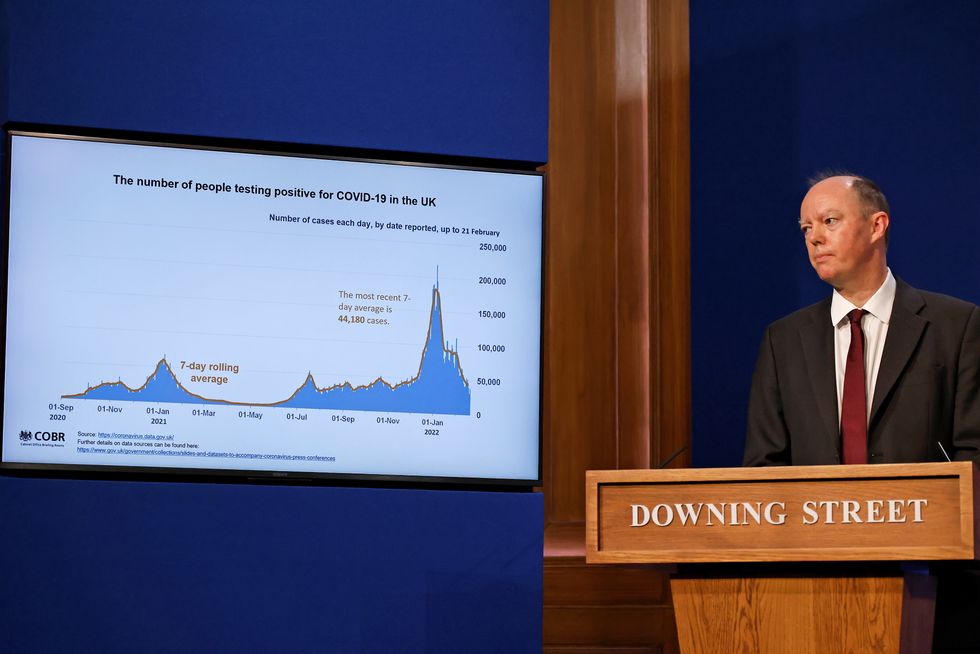Covid laws could become permanent in UK despite end of isolation restrictions

The legal requirement to isolate is to be scrapped within days as the Prime Minister vowed to remove 'all remaining domestic restrictions in law'
Don't Miss
Most Read
Latest
Remaining restrictions on travel could be reviewed before Easter but some laws introduced during the pandemic will be made permanent, according to the Government’s plan for living with coronavirus.
The legal requirement to isolate is to be scrapped within days as the Prime Minister vowed to remove “all remaining domestic restrictions in law”.
The Government’s Living with Covid plan sets out its intention for other legal provisions to remain indefinitely, while others will be reviewed at a later date.
The document said: “The Government is committed to removing unnecessary provisions from the statute book as soon as possible and will look for opportunities to do so as the Government’s legislative programme proceeds.”
Chief medical officer Sir Chris Whitty during a media briefing in Downing Street, London, to outline the Government's new long-term Covid-19 plan. Picture date: Monday February 21, 2022.
Tolga Akmen
It pledges to review remaining travel restrictions – which require some travellers to provide certain information upon arrival in England, take Covid tests before and after their journey, self-isolate and impose obligations on travel operators to ensure passengers supply this information and comply with the requirements – before they expire in May.
The document said: “With the intention to continue to facilitate safe travel and sector recovery, and in the context of having significantly reduced travel restrictions, the Government will review The Health Protection (Coronavirus, International Travel and Operator Liability) (England) Regulations 2021 before Easter and ahead of their expiry date of 16 May.”
Several of the original provisions imposed under the Coronavirus Act 2020 – introduced to allow the Government to “support individuals, businesses, and public services during the pandemic” – have already expired.
A further 16 provisions – including measures covering the emergency registration of health workers, how deaths are recorded and protection from eviction or forfeiture for residential or business tenancies – will expire at midnight on March 24, the document said.
But the Government wants to make four remaining provisions, which it says have “enabled innovations in the delivery of public services”, permanent. It plans to seek approval from Parliament and see the laws come into force over the spring and summer.
Danny Lawson
These provisions, set out in four sections of the Act, have allowed virtual hearings to take place for court cases and meant that where Covid-19 is suspected to be the cause of death, coroners in England and Wales have been able to hear an inquest without a jury.
These are due to expire within six months and will each require a final six-month extension to “ensure there is no gap in the legislation that enables public service delivery”, the Government said.
The procedures are helping to reduce backlogs in cases and “bring more people to justice”, the Government said. It plans to make the measures permanent in the Police, Crime, Sentencing and Courts Bill and the Judicial Review and Courts Bill.
Two other elements of the Act would need fresh legislation to repeal if they needed to be changed and are “still necessary to support the recovery from the pandemic”.
According to the document, this ensures “any gaps in indemnity cover for NHS clinical negligence do not delay or prevent ongoing care”, adding: “Without this, NHS Resolution would be unable to pay legitimate clinical negligence claims, leaving clinicians exposed to the full cost and patients without compensation.”
The second ensures financial limits under the Industrial Development Act “do not hinder the allocation of vital Government schemes for businesses such as the Help to Grow scheme, the Automotive Transformation Fund, and the Offshore Wind Manufacturing Investment Scheme (OWMIS).”
The document adds: “Once the Government has received the conclusions of the Covid-19 public inquiry, it will consider whether further changes to public health legislation are needed. The Public Health (Control of Disease) Act 1984 and any outstanding provisions in the Coronavirus Act 2020 would be in scope for this work.
“The Government will also work with the Devolved Administrations, who have used their specific powers within the Coronavirus Act during the pandemic, to help transition provisions into devolved legislation where necessary.”













